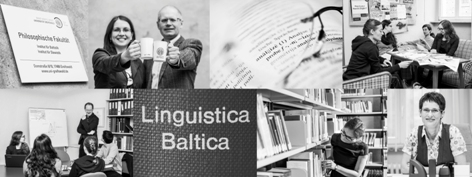
History of Baltic Studies
‘Baltic Studies’ belongs to the humanities and encompasses the study of Latvian, Lithuanian and Old Prussian languages and literatures. Nowadays, Baltic Studies is increasingly evolving into a discipline that studies the entire Baltic region, including all its inhabitants, their diverse languages and subcultures, as well as their social and cultural interdependence with neighbouring regions.
Institutions performing research into the Baltic States have existed in German-speaking countries for 300 years: in 1718, the first such centre, the ‘Litthauisches Seminar’ (Lithuanian Seminary), was established at the University of Königsberg (now Kaliningrad). Its purpose was to provide Protestant pastors with language training for their parish work in East Prussia, where a large number of Lithuanians lived at the time. The Baltic Studies department existed in Königsberg until the Second World War. Almost at the same time as Königsberg, a ‘Litthauisches Seminar’ was also created in Halle. It was closely linked to the Pietism movement there.
In the 19th century, Indo-Europeanists across Europe studied the Baltic languages, which they considered particularly ancient. After the Baltic States were formed at the beginning of the 20th century, Baltic Studies diversified: Estonian studies, Latvian studies and Lithuanian studies emerged. The three states established seminaries for their national philologies at their universities in Tartu, Riga and Kaunas.
After the Second World War, further centres for Baltic Studies were established in Germany, for example in Munich, Berlin, Bonn and Münster. With the Baltic States' loss of sovereignty, Baltic Studies abroad received a special significance in terms of preserving cultural traditions. At the same time, research interests were subject to modernisation. Although the institutions had developed their own traditions, the landscape changed again after 1990.
Greifswald's Department of Baltic Studies was founded in 1993. Today, it plays the role of a neutral observer. At the same time, it builds cultural bridges to the Baltic States. The Department's portfolio covers a broad spectrum: language courses in Latvian and Lithuanian, literary translation, cultural events, text editions, social empirical surveys, conferences on language policy and grammar, metaphor research, cultural-historical studies and classical literary analysis.
See also: Baltic Studies as a discipline
In this section, you will find information on the department’s history.
